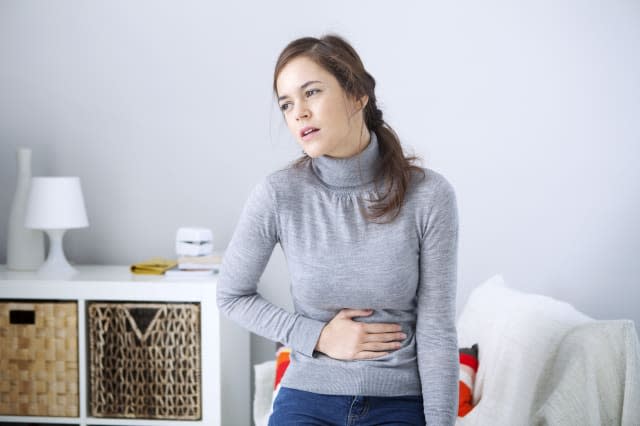Five digestive problems that can cause weight gain

Being bloated can make your jeans feel tight, but there are some digestive problems that can lead to long-term weight gain. Here are five ways that tummy troubles could be causing you to pile on the pounds.
See also: Gut health and weight loss: what you need to know
See also: Yo-yo dieting 'triggers caveman response which can mean weight gain'
1. Gastroesophageal reflux disease
If you have gastroesophageal reflux disease (GERD), you'll know just how painful it can be. The sensation of heartburn is caused by stomach acid rising back up into the oesophagus.
While eating can help to relieve the symptoms in the short term (the saliva produced from chewing food helps to neutralise the acid), the relief is only temporary. And once the food starts to digest, the extra acid production can make things worse. It's easy to see how sufferers can get drawn into a negative cycle of eating that leads to weight gain.
What you can do: Stick to a GERD friendly diet and try taking an over-the-counter medication. Your doctor or pharmacist will be able to advise the best one to take.
2. Stomach ulcers
People with stomach ulcers can also find that eating improves their symptoms. That's because food temporarily coats the ulcer with a protective lining and neutralises the stomach acid. However, just like with GERD, the relief is short lived.
Once the food digests, stomach acid increases – leading to bloating and nausea, which makes you to want to eat to relieve the symptoms. Again, this continual cycle of eating can lead to weight gain.
What you can do: Taking an over-the-counter antacid can help, as can avoiding stress, alcohol, spicy foods and smoking. Your doctor may prescribe proton pump inhibitors or H2-receptor antagonists, both of which work by reducing the amount of acid your stomach produces. Don't take ibuprofen or aspirin, as these can cause internal bleeding.
3. Your gut is slow
Slow bowel movements and constipation can also cause the scales to creep higher. Ideally, you should have a bowel movement at least once or twice a day. If you're less regular, a number of things, including diet, could be to blame. For example, prescription drugs and over-the-counter medication, dehydration, lack of exercise - even not having enough 'good' bacteria in your gut.
What you can do: To stay regular, increase the amount of fibre in your diet. Think whole-grain breads, cereals, pastas and wheat bran. Drinking plenty of water (at least eight glasses a day) and exercising may also help. If you experience other symptoms alongside constipation on a regular basis, such as bloating and pain, see your doctor.
4. Poor gut flora
There are trillions of bacteria in your gut which help to digest food, produce vitamins, regulate hormones and excrete toxins. If you have too many bad bacteria, like parasites or yeast, or not enough good bacterial (like Lactobacillus or Bifidobacteria), the result can be poor health.
Experts believe that the type of bacteria you have in your gut can affect how many calories you absorb from food. Not only that, but certain intestinal microbes may change your sensitivity to insulin, encouraging the body to burn fat rather than store it.
What you can do: Up your intake of fibre by eating more vegetables, fruits and whole grains, particularly prebiotic foods, such as garlic and leeks. Eating naturally fermented foods, such as kefir, kmbucha, sauerkraut, and Greek yoghurt can also help. You might also want to consider taking a probiotic supplement.
5. Bacteria overgrowth
You know that your gut contains good and bad bacteria – and so too, does your bowel. When the balance of the bacteria in your bowel is off balance, the result can be small intestinal bacterial overgrowth.
The name itself sounds bad enough – but it's particularly bad news if you're on a diet, as the condition can lead to weight gain. The extra bacteria can cause more methane gas production, which slows the overall functioning on the small intestine, allowing more calories to be absorbed from the food you eat.
At the same time, your metabolism is likely to slow, which can have a negative impact on your insulin and leptin resistance. The result? You're likely to feel hungrier than usual and crave carbs.
What you can do: Eat a healthy diet that's high in fibre and prebiotics. It's also important to steer clear of antibiotics (which kill both good and bacteria) unless you really need them. If you suspect you already have a problem, taking a digestive supplement may help. Ask for pharmacist for advice.



